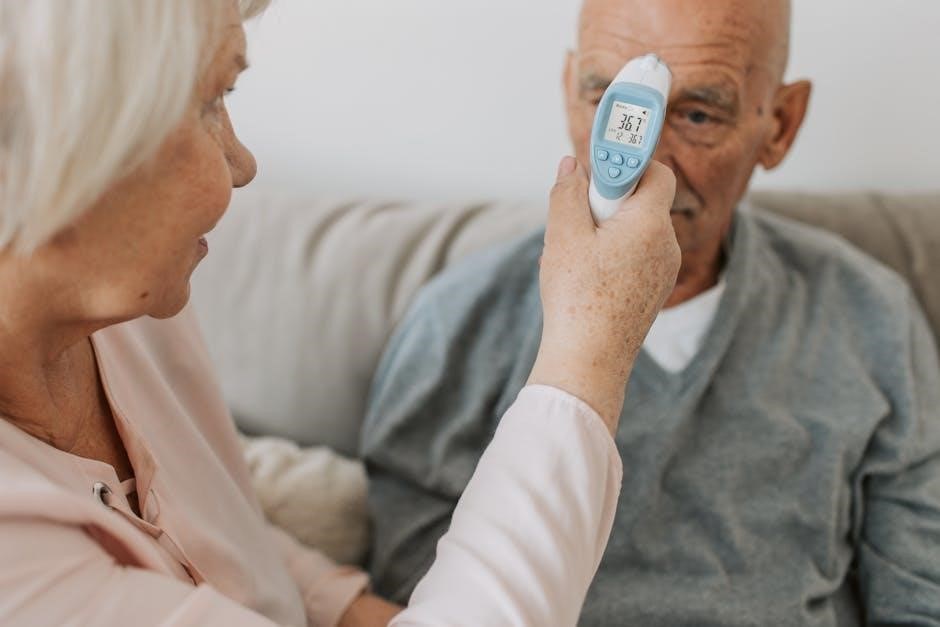Critical care nursing questions and answers PDFs offer comprehensive resources for nurses, covering patient assessment, ethical considerations, and clinical scenarios․ These materials are essential for exam preparation and professional growth, providing insights into hemodynamic monitoring, respiratory care, and neurological nursing․ They include multiple-choice and true/false questions, ideal for self-assessment and understanding critical care concepts․ Available on platforms like Docsity, these PDFs are valuable tools for both students and practicing nurses seeking to enhance their expertise in intensive care settings․
1․1 Overview of Critical Care Nursing
Critical care nursing is a specialized field focused on caring for patients with life-threatening illnesses or injuries․ It involves high-intensity interventions, close monitoring, and evidence-based practices to stabilize and improve patient outcomes․ Critical care nurses work in intensive care units (ICUs), emergency departments, and other acute care settings․ Their responsibilities include managing complex medical devices, administering medications, and responding to emergencies․ The role requires strong clinical skills, critical thinking, and the ability to make quick decisions․ Critical care nursing also emphasizes patient-centered care, addressing both physical and emotional needs․ The field continuously evolves with advancements in technology and medical research, making it essential for nurses to stay updated․ Resources like questions and answers PDFs help nurses prepare for exams and refine their expertise in this demanding yet rewarding specialty․

1․2 Importance of Questions and Answers in Nursing Education
Questions and answers play a vital role in nursing education, particularly in critical care nursing․ They help reinforce key concepts, identify knowledge gaps, and prepare students for exams like the CCRN certification․ Q&A resources, such as those found in PDFs, provide real-world scenarios and evidence-based solutions, enhancing critical thinking and decision-making skills․ They also simulate exam environments, reducing anxiety and improving time management during tests․ Additionally, these materials allow nurses to apply theoretical knowledge to practical situations, ensuring they are well-prepared for the challenges of intensive care settings․ Regular practice with Q&A materials fosters confidence and competence, which are essential for delivering high-quality patient care in critical situations․

Core Topics Covered in Critical Care Nursing PDFs
Critical care nursing PDFs cover essential topics like patient assessment, hemodynamic monitoring, respiratory care, neurological nursing, and ethical considerations․ These resources provide in-depth insights into intensive care practices․
2․1 Patient Assessment and Monitoring
Patient assessment and monitoring are critical components of critical care nursing, ensuring timely identification of changes in a patient’s condition․ These processes involve physical examinations, vital sign monitoring, and interpretation of diagnostic data such as EKGs and arterial blood gases (ABGs)․ Nurses must assess respiratory, cardiovascular, and neurological status to prioritize care․ Monitoring tools like central venous pressure (CVP) and pulmonary artery pressure (PAP) help guide fluid and hemodynamic management․ Regular reassessment ensures interventions are adjusted to meet patient needs․ This section provides questions and answers to help nurses master these skills, emphasizing the importance of accurate documentation and evidence-based practices in critical care settings․ Effective monitoring is key to improving patient outcomes and preventing complications․
2․2 Hemodynamic Monitoring and Management
Hemodynamic monitoring is a cornerstone of critical care nursing, focusing on assessing and managing a patient’s cardiovascular system․ This includes interpreting blood pressure, cardiac output, and vascular resistance to guide fluid and vasopressor therapy․ Nurses must understand invasive and non-invasive monitoring tools, such as arterial lines and Swan-Ganz catheters, to optimize cardiac function․ Managing hemodynamic instability involves recognizing signs of shock, titrating medications, and ensuring adequate perfusion of vital organs․ These resources provide detailed questions and answers on hemodynamic principles, case scenarios, and evidence-based interventions․ Mastery of hemodynamic monitoring enables nurses to make informed decisions, improving patient outcomes in high-acuity settings․ Accurate interpretation of data is crucial for effective management․
2․3 Respiratory Care in Critical Illness
Respiratory care is vital in critical illness, focusing on managing breathing difficulties and ensuring adequate oxygenation․ Nurses must assess respiratory status, including lung sounds, oxygen saturation, and ventilatory mechanics․ Mechanical ventilation is a key intervention, requiring skill in setting parameters and weaning patients․ Understanding conditions like acute respiratory distress syndrome (ARDS) and chronic obstructive pulmonary disease (COPD) is essential․ Nurses must also manage airway clearance, suctioning, and oxygen therapy․ These resources provide questions and answers on ventilator management, respiratory medications, and troubleshooting common issues․ Effective respiratory care improves patient outcomes, reduces complications, and enhances quality of life in critically ill patients․ Evidence-based practices guide decision-making in this specialized area of nursing․
2․4 Neurological Nursing and Care
Neurological nursing focuses on caring for patients with brain, spinal cord, or nervous system injuries or disorders․ Critical care nurses assess neurological status using tools like the Glasgow Coma Scale and monitor for signs of deterioration․ Managing intracranial pressure (ICP), ensuring cerebral perfusion, and preventing complications are key interventions; Nurses must recognize and respond to seizures, strokes, and traumatic brain injuries․ Questions and answers in this section cover assessment techniques, ICP management, and interventions for neurological emergencies․ Understanding neuroprotective strategies and rehabilitation needs is also emphasized․ Effective neurological care improves patient outcomes, reduces long-term disabilities, and supports recovery in critically ill patients with neurological conditions․
2․5 Ethical Considerations in Critical Care
Ethical considerations in critical care nursing involve complex decision-making to ensure patient-centered care․ Nurses face dilemmas like end-of-life decisions, withholding or withdrawing life support, and resource allocation․ Maintaining patient autonomy, dignity, and rights is paramount․ Confidentiality, informed consent, and cultural sensitivity are key ethical principles․ Questions and answers in this section address these challenges, providing guidance on navigating moral and legal issues․ Critical care nurses must balance beneficence, non-maleficence, autonomy, and justice in high-pressure situations․ Understanding ethical frameworks and hospital policies is crucial for making sound decisions․ These resources help nurses uphold ethical standards while providing compassionate care in critical settings․

Common Critical Care Nursing Interview Questions

Critical care nursing interview questions often focus on patient assessment, hemodynamic monitoring, respiratory care, and ethical dilemmas․ They are designed to evaluate clinical skills and decision-making abilities․
3․1 Frequently Asked Questions in Nursing Interviews
Critical care nursing interviews often include questions on patient assessment, hemodynamic monitoring, respiratory care, and ethical dilemmas․ These questions evaluate clinical skills and decision-making abilities․ Common topics include managing acute respiratory distress, interpreting arterial blood gases, and prioritizing patient care․ Candidates may also face scenario-based questions, such as handling cardiac arrest or sepsis․ Additionally, ethical considerations, like end-of-life care decisions, are frequently discussed․ Interviewers assess how well nurses can apply critical thinking and evidence-based practices in high-pressure situations․ Reviewing these questions in PDF resources helps prepare for interviews and ensures a strong understanding of critical care principles and practical applications in real-world scenarios;
3․2 ICU Nursing Interview Questions and Answers
ICU nursing interview questions focus on critical care scenarios, patient prioritization, and clinical expertise․ Candidates are often asked about managing life-threatening conditions, such as cardiac arrest or severe trauma․ Questions may include interpreting lab results, hemodynamic monitoring, and ventilator management․ Ethical dilemmas, like resource allocation in overwhelmed ICUs, are also common․ Interviewers assess problem-solving skills and the ability to remain calm under pressure․ Resources like ICU nursing interview questions and answers PDFs provide sample inquiries and model responses, helping nurses prepare for these challenging discussions․ These tools highlight the importance of evidence-based practices and effective communication in critical care settings․

Certification Exam Preparation
CCRN certification exam preparation involves practice questions and answers, focusing on critical care scenarios, hemodynamics, and respiratory management․ Resources like CCRN practice PDFs and sample exams aid nurses in mastering essential topics for the certification exam, ensuring clinical competence in acute and critical care settings․
4․1 CCRN Certification Overview
CCRN certification is a prestigious credential for critical care nurses, demonstrating specialized knowledge in acute and critical care․ Offered by the American Association of Critical-Care Nurses (AACN), it validates expertise in caring for critically ill patients․ Over 95,000 nurses hold this certification, reflecting its recognition in the field․ The exam assesses clinical judgment, patient care, and ethical decision-making․ It consists of 150 multiple-choice questions, covering topics like cardiovascular, respiratory, and neurological care․ Eligibility requires specific clinical experience, and the exam fee varies for AACN members and non-members․ Passing the CCRN exam enhances career opportunities and signifies a commitment to excellence in critical care nursing․
4․2 Practice Questions for CCRN Exam
Practice questions for the CCRN exam are essential for effective preparation, offering realistic scenarios and multiple-choice formats․ These questions cover critical care topics such as cardiovascular, respiratory, and neurological nursing․ Many resources, including PDFs from platforms like Docsity, provide sample questions that mirror the actual exam․ They include clinical scenarios requiring decision-making skills, such as managing sepsis or respiratory distress․ Additionally, flashcards and true/false quizzes are available to reinforce knowledge․ The Canadian Association of Critical Care Nurses (CACCN) also offers exclusive practice materials for members․ Regularly practicing these questions helps identify knowledge gaps and builds confidence for the certification exam, ensuring nurses are well-prepared to provide optimal patient care․

Critical Thinking Exercises in Nursing Care
Critical thinking exercises in nursing care involve case studies and scenario-based questions, helping nurses apply knowledge to real-life situations․ These exercises improve decision-making skills and clinical judgment, enhancing patient outcomes in critical care settings․

5․1 Case Studies and Scenario-Based Questions
Case studies and scenario-based questions are essential tools for developing critical thinking in critical care nursing․ These exercises present real-life clinical scenarios, challenging nurses to apply their knowledge and skills to complex patient situations․ For example, a case study might involve a patient with acute respiratory distress, requiring the nurse to prioritize interventions and evaluate outcomes․ Scenario-based questions often include multiple-choice or open-ended formats, encouraging nurses to think critically about patient assessment, diagnosis, and treatment․ These exercises are particularly valuable for preparing nurses to handle high-stakes situations, such as cardiac arrests or neurological emergencies, by simulating the decision-making process in a controlled environment․ They also foster collaboration and problem-solving, enabling nurses to refine their clinical judgment and improve patient care outcomes․

Resources for Critical Care Nursing Questions and Answers
Recommended PDFs and online platforms provide extensive resources, including practice exams and case studies, to aid nurses in refining their critical care skills and knowledge effectively․
6․1 Recommended PDFs for Nursing Students
Recommended PDFs for nursing students are essential resources for exam preparation and skill enhancement․ Platforms like Docsity offer extensive collections of critical care nursing questions and answers, including practice exams and case studies․ These PDFs cover a wide range of topics such as patient assessment, hemodynamic monitoring, and respiratory care․ They are designed to help students understand complex concepts through multiple-choice questions, true/false quizzes, and scenario-based exercises․ Additionally, many PDFs include sample questions from certification exams like the CCRN, making them invaluable for aspiring critical care nurses․ These resources are easily accessible and provide a structured approach to learning, ensuring nursing students are well-prepared for both academic and professional challenges in critical care settings․
6․2 Online Platforms for Practice Exams
Online platforms provide convenient access to critical care nursing practice exams, enabling students to test their knowledge effectively․ Docsity and Quizlet are popular resources, offering a wide range of critical care nursing questions and answers in PDF formats․ These platforms feature multiple-choice questions, true/false quizzes, and scenario-based exercises tailored for exam preparation․ Additionally, the Canadian Association of Critical Care Nurses (CACCN) offers exclusive practice questions for its members, focusing on advanced critical care topics․ These online resources are invaluable for nursing students, allowing them to assess their understanding and improve their clinical decision-making skills in a structured and accessible manner․ They are also regularly updated to reflect current trends and standards in critical care nursing․



